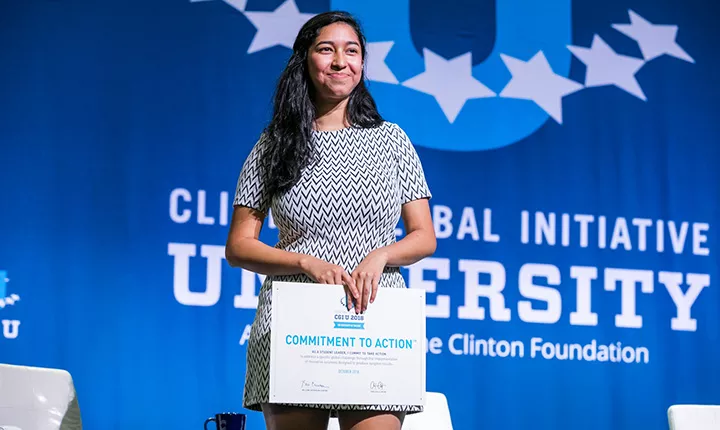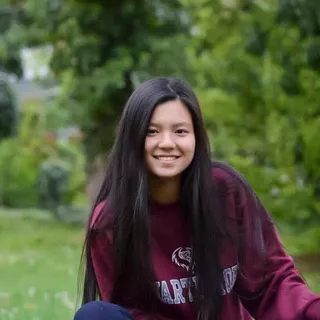Clinton Global Initiative Recognizes Swarthmore Students for Social Change Efforts

“Being recognized by the Clinton Foundation was so surreal and one of the best days of my life,” Castillo says. “It was also my 20th birthday, and my friends in the crowd started screaming, ‘Happy birthday!’ and then the entire audience sang to me—I almost passed out.”
Six Swarthmore students—Rebecca Castillo ’20, Alice Dong ’19, Ariana Hoshino '20, Vanessa Meng '20, Li Tian '19, and Nancy Yuan '20—demonstrated their commitment to social change at the 11th annual Clinton Global Initiative University (CGI U) meeting, held at the University of Chicago last month.
Funded by the Center for Innovation and Leadership (CIL), the Lang Center for Civic and Social Responsibility, and the President's Office, the six students were each invited to attend the conference after a competitive application process. The CGIU Commitment to Action program includes a trip to the CGIU Conference, mentorship, and on-campus advising. Katie Clark, CIL director, and Denise Crossan, the Lang Visiting Professor for Issues of Social Change, accompanied them at the event.
CGI U brings together students and community leaders to inspire civic engagement and work toward global justice. To attend the conference, each student developed their own Commitment to Action project, a specific and measurable plan that advances a solution to major societal issues.
For the Swarthmore team, the commitment to actions included a media literacy education project from Castillo and Hoshino; a program closing the gender gap for women in chess from Dong; tackling Zero Waste initiatives at the College for Meng; helping Chinese high school students develop habits of mental health from Tian; and a Pacific Youth Climate Summit for Pacific students that are passionate about climate activism in their communities from Yuan. Dong was also part of a team that won the CGI U's Codeathon with an app designed for local disaster aid outreach.
Castillo was one of only two students honored on stage by the Clinton Foundation for her outstanding Commitment to Action. She was recognized for her ongoing Storyboard program, a media literacy education project that teaches underrepresented high school students how to voice their own stories.
“So much of the media is dominated by rich, white men, says Castillo. “As a low-income Latina and the daughter of immigrants, it’s really frustrating to see them controlling the narratives about my community. There needs to be more diversity in who has that power.”
Storyboard developed into a clear vision after Castillo interned with the Los Angeles Times, where she realized that her passions for photography and video journalism could be used for social good. She saw that granting access to technology and media trainings could provide underrepresented populations with the tools to voice their own narratives. Castillo teamed with Hoshino to apply for a $25,000 Project Pericles Fund grant from the Lang Center, which they used to implement Storyboard.
Their project officially launched in the summer with a four-week media intensive workshop in Los Angeles. Castillo and Hoshino taught 10 high school girls how to leverage photography, film, and writing to tell their stories for social change. The project culminated with a film showcase of multimedia stories produced by each participant in the workshop about a meaningful issue in their communities.
“Being recognized by the Clinton Foundation was so surreal and one of the best days of my life,” Castillo says. “It was also my 20th birthday, and my friends in the crowd started screaming, ‘Happy birthday!’ and then the entire audience sang to me—I almost passed out.

Dong and her team won the Codeathon with an app designed for local disaster aid outreach.
“I was so excited that people were talking about Storyboard and the lack of accessible digital media education in low-income communities because it’s an issue that isn’t really talked about.”
Beyond the awards ceremony, the CGI U event was also an opportunity for students to connect with global leaders and experts to practice and further their skills for creating change.
CGI U also included a “Code for Impact” Codeathon, in which students were challenged to develop a digital tool that could increase the effectiveness of natural disaster response and relief efforts. Students then presented their project ideas to a panel of judges, which included Chelsea Clinton.
Dong was part of the Codeathon’s winning team. She and her teammates were recognized for brainstorming an application called Basic Aid Outreach, which uses the location services in social messenger apps to connect community members with one another after a natural disaster.
“It was incredibly humbling and amazing to see the amazing projects everyone else came out with,” Dong says. “Probably the coolest part of the event was when [former President Bill Clinton] surprised our team on our way offstage, shook our hands, took a picture with us, and spoke to us briefly.”
For both Dong and Castillo, attending the CGI U event was an unforgettable experience that offered them the opportunity to connect with other change-makers and inspired them to keep working toward positive global transformation.
“The conference taught me a lot in terms of how every little step matters and that everyone’s projects have different magnitudes of potential impact,” says Dong, “but what matters is that you are doing what you can in order to help better the world with what skills you have.”
Learn about Swarthmore’s impact on the local and global community at lifechanging.swarthmore.edu.



